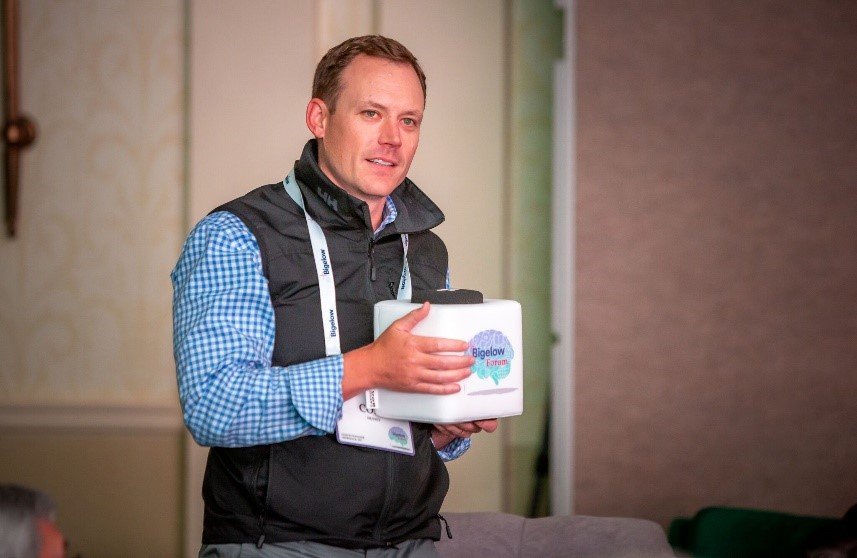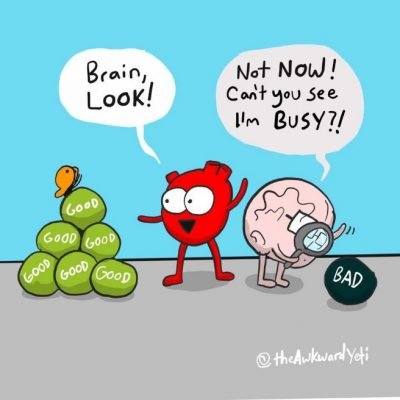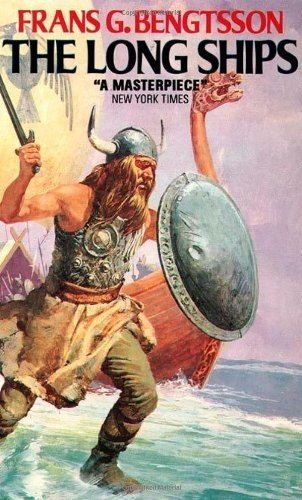2.5 minute read
Portsmouth, NH
From the great good luck of working with some of the most successful Entrepreneur Owner-Managers (EOMs) on the planet, I have learned that in our domain, Negativity Bias is the most pervasive and damaging cognitive bias for us to overcome in our lives. And when we overcome it, it increases achievement and fulfillment—for us, our families, and our communities—more than any other behavioral change I can think of. So, how do we free ourselves from this outdated prejudice?
As private business owners, the quality of our decisions is everything. Why? Unless you are a solo crafter, we are all leveraged—by our skilled teams, vast amounts of technology, a superabundance of capital, and most of all, 24 x 7 instant global connectivity and communication. The quality of our decisions is the source of our entrepreneurial strength—good decision making, and the resulting high leverage on our decisions. That’s why something that deludes us—a cognitive bias—is so potentially destructive to unlocking our potential.
It’s widely agreed that there is a general Negativity Bias in humans. It’s based on an evolutionary tendency to give greater weight to negative things (relationships, events, places, traits, activities) than positive ones. Repeated research is clear: given negative and positive events of equal objective magnitude, you experience (feel) a negative event more powerfully than a positive one.
Even when we algebraically evaluate negative and positive events (or objects, people, traits, places, etc.) our conclusion is almost always more negative than the pure objective calculation of the subjective values of those individual characteristics. You with me here? Even when we attempt to coldly and rationally measure positives and negatives—we unconsciously give more weight to the negative.
The “father of contemporary Positive Psychology,” Marty Seligman of the University of Pennsylvania, is one of the most gifted independent thinkers I have ever met (and endlessly entertaining besides). He hilariously describes Negativity Bias: “Negativity Bias is like the tongue in our mouth. Our tongue swirls around our mouth ever vigilant to find that popcorn husk stuck in our teeth. When it does, full attention is focused on that popcorn husk until it is dislodged. We can’t leave it alone. Why is it our tongue never just cruises around the mouth saying, “Oh, what 31 other beautiful, smooth, perfectly shaped teeth I have!”. Instead, we ruminate on the problem, won’t rest until we “fix it,” and behave and live as if we are incapable of redirecting our consciousness.”
Our Homo sapiens’ brain has biologically evolved over billions of years, and our brain is not trained to optimize our happiness. It’s trained to help us survive. Historically, the chances of survival increased when we looked all around us and identified everything that’s wrong all the time so we can fight it or flight from it. As humans, we are evolutionarily hardwired to notice what isn’t working—potential threats.
So, what do we do when we are biologically evolved to be a hunter gatherer but… live in 2020, where there are no more sabretooth tigers to fight off anymore? We are living in a world we are not evolved for. When faced with an unknown, it’s not the unknown that scares us. It’s that we think we know what is really going to happen—and that it’s going to be bad. That’s strictly our Negativity Bias. After all, we really don’t know what’s going to happen. We can’t know the future, it’s not knowable.
For private business owners, the disproportionate power of negative emotions is at the core of the slice of Prospect Theory (Kahneman & Tversky, 1979) described as Loss Aversion. The principle of Loss Aversion shows that losses are experienced as more negative than the same quantity of gains are experienced as positive. In its simplest form, the experience of losing $1,000 “feels worse” than the experience of winning $1,000 “feels good.” Over a broad spectrum of domains, as business owners, our behaviors are consistently risk averse for gains and “risk seeking” for losses. Meaning, a sure loss is so objectionable that we incur risks to avoid them.
So, do smart people have more Negativity Bias? I think they might. Decoding Naval Ravikant, you are not smart because you are negative. But you may have more Negativity Bias because… you are smart… very smart people (those with high situational awareness) more easily see behind the illusion that everyday life is safe or secure, you see the downside risks and the calamities that can await us. Maybe if you know too much, have experienced too much, you understand too much. You ruminate, your “mind is on” 24 X 7, your sleep is much worse, you are caught in “busy-ness,” you find yourself angry or resentful. What many successful EOMs who ruminate on negatives do is medicate the bias to negativity with alcohol, marijuana, mindless television, anonymously videogaming in our PJs covered with Cheeto dust…other social media. It’s all the same, we are trying to temporarily forget the pain. Why do we desire that anesthetized state? Ever ask yourself, why do we need to self-medicate that Negativity Bias? Is there another way?
Homo sapiens sapiens: us, the ones who think and know they think. Nature equipped us with Negativity Bias for its adaptive evolutionary value. It used to have a function, be a feature. Today that “feature” is a “bug.” Even though evolution later granted us with higher reasoning and intellectual capacities of the frontal cortex, we still approach all new stimuli and novel experience with a cautious awareness of potential danger, threats, insults, and failures. Personally, I “know” this, but putting it into action is a really challenging work in progress—at least for me.
Our degree of consciousness, attention, or focus determines our capacity to learn. Attention or focus is the distinguishing mark of genius—the cultivation of attention that is the result of deliberate practice. Are we focused on the popcorn husk or those 31 other beautiful teeth?
See, in life…at least in EOM life, we get what we focus on.
P.S. / Fun thought experiment
The playful psychologist Paul Rozin memorably asks us this: If you have a delicious pizza that you are looking forward to eating, one brief contact with a snake on any part of it will usually render the entire beautiful pizza inedible. Yet, in the inverse phenomena, consider food that you dislike…whether liver, brussels sprouts, fishy fish. If you touch the delicious piece of pizza to them, does it make them desirable to eat? No? Well why does touching the snake to the pizza make it inedible? In other words, what would be the anti-snake?
What I am Reading / Listening to
The Long Ships (1942)
By Frans G. Bengtsson
How the hell did that happen? I asked myself as I thwacked the book shut.
How the hell did I get to be my age reading everything I can get my hands on ever since Miss Thorpe in the Manchester Public Library encouraged me to, and never came across, never even heard of, The Long Ships? What an extraordinary read.
Hey, my literary education isn’t anything to write home about, but I read. I always have a half dozen books going at a time. Usually there is professional reading (early morning), plus professional or personal development (morning), plus nonfiction biographies, plus historical fiction (evening), and just plain page-turners made for the beach. I am talking 100+ books a year, every year for say, 30+ years. At the least. So how could I have never heard of The Long Ships?
So, when Michael Lewis (Liars Poker (1989), Money Ball (2003), The Big Short (2010), The Undoing Project (2016), et al) was being interviewed by Tim Ferriss on his podcast, I was all ears. I like most of Lewis’ work and particularly appreciated Liars Poker and Money Ball. The Undoing Project is nominally about the relationship between my heroes Amos Tversky and Dan Kahneman, and while I loved the fact that he wrote it, I didn’t find his usual insight and humor. (Perhaps he didn’t get the joke. Kahneman is cunning).
So when Tim closed with one of his accustomed rapid-fire departing questions to Lewis, “What is the one book that you have gifted more than any to others?” and Lewis instantly answered, “The Long Ships,” I went into action, found it in the library, and away I went. And wow, did I go away and cover some ocean. This is an adventure book with the verisimilitude of historical fiction that entertains, educates, evokes lessons, and smiles.
The Long Ships is an epic; a record of a series of three voyages taken by a crafty, resourceful, unsentimental, mildly hypochondriacal Norseman named “Red Orm” Tostesson told in four parts. Bengtsson recreates the world of 1000 AD, as seen through the eyes of some of its northernmost residents, with a keen grasp of the detail and tireless spirit of a born storyteller.
I am not a book reviewer by training or by temperament. Clearly any further attempt to summarize by me would be madness. There’s simply too much. If you’ve read this far, I suspect you will find out what happens on your own. If you’re curious, you’ll enjoy learning about the actual history, the customs, and the character of the people involved with each new adventure. It’s also satisfying to track Orm’s growth as a man, a leader, and what must have passed at that time, for a person of integrity and honor.
I found this work strangely reminiscent of that giant of all historical fiction authors—Patrick O’Brien. While Orm and Toke don’t have the brilliant banter of Aubrey and Maturin still…there is something there.
And hey, if I didn’t know about this fabulous read, then there must be others out there I don’t know about equally as entrancing. Now that’s a joyful thought.
Strongly Recommend.
A quick note: I customarily mark up and make notes and highlight my professional reading on physical books, and read the lighter stuff using the kindle app on my iPad. My reading taste is wide: sure Harari, Kahneman, Taleb, Haidt, Aurelius, Schumpeter, Bertrand Russell, William James, Benjamin Franklin, TR, and others. But I also devour Iris Murdoch, Liz Gilbert, Ann Patchett, and Delia Owens. (In case you are wondering, I haven’t read Gilbert’s Eat, Pray, Love, but I read her Signature of All Things twice cover to cover in sequence I relished it so much). And almost nothing relaxes me like page turners from Robert Crais, Michael Connelly, Lee Child, Daniel Silva, Jeffrey Archer, John Grisham, hell, even Harlan Coben (whom I first discovered in the Man-O-War Marina free lending library (take one-leave one) 20 years ago).
Entrepreneur Owner-Manager Quote
“My father would probably tell you that my brothers and I are in the 'Don't screw it up!' phase.”
- Cory R. Hussey, COO & General Counsel, Stanley Elevator Company, Inc.

Energy Creation
Contributed by Mari B. Lister
I read a lot. I always have. My dad has been a first edition book collector his entire life and many of my favorite childhood memories revolve around him showing me some of his favorites from the various rooms in our house that were his libraries or “bibliotecas,” as we always called them. He instilled in me a love of books. Not just the content, but actual physical books. The smell. The different paper types. The various types of illustrations. Even the nuances of the beauty that can be found in the dedications (often overlooked, in my opinion). He himself is obviously a voracious reader – reading everything from poetry to nature books. When I was younger, I found that I too read a wide variety of books – from classic Spanish works by Octavio Paz to the poems of Edgar Allen Poe (one of my childhood favorites!). As an adult, and more specifically I would say in the last ten years, I realized that my variety had really narrowed. I found myself reading only fiction and most often crime / suspense, historical fictions, or more generally the “a novel” variety. It got me to thinking. And it also made me a little sad. Why had I abandoned the love I had for reading both in Spanish and English? In jumping around from genre to genre? I mean I must get more, both intellectually and emotionally, by broadening my horizons and consuming a greater diversity of works, right? Candidly, I was kind of beating myself about it. I felt like the younger me had been more intellectual and a greater lover of books.
But as I thought about it more, I realized something. What I had always loved about books, what my father had instilled me, was still alive and kicking: their ability to transform. Yes, books often allow you to travel to another world, another time – walk in the shoes of someone you would otherwise never have gotten the chance to know / met – but for me I realized, they did so much more. I literally often fall in love with a character(s) or storyline so much that I mourn the ending of the book. I find myself unable to start a new book immediately because I am “grieving.” I grieve the family I had gotten to know so intimately or the failed love story or the tragic death as if I was part of that family, as if I was the one who lost that love, or the one mourning the death of my sibling. The ability to be so wholly transformed is what is most powerful about books. They give me new life every time I start a new one, even though I know the ending of it will hurt. They allow me to completely and totally disconnect from all of my problems, my concerns, my day to day, and live in someone else’s. And that immersion, that complete abandonment recharges me, frankly like nothing else I have tried. So, while these days my interests may have narrowed, my love and total appreciation for the power of books remains unfailing.
P.S. This is one of my favorite book dedications
The Lion, The Witch, And The Wardrobe, by C.S. Lewis
To Lucy Barfield
My Dear Lucy,
I wrote this story for you, but when I began it I had not realized that girls grow quicker than books. As a result you are already too old for fairy tales, and by the time it is printed and bound you will be older still. But some day you will be old enough to start reading fairy tales again. You can then take it down from some upper shelf, dust it, and tell me what you think of it. I shall probably be too deaf to hear, and too old to understand, a word you say, but I shall still be your affectionate Godfather.

© 2024 Bigelow LLC. All rights reserved.


